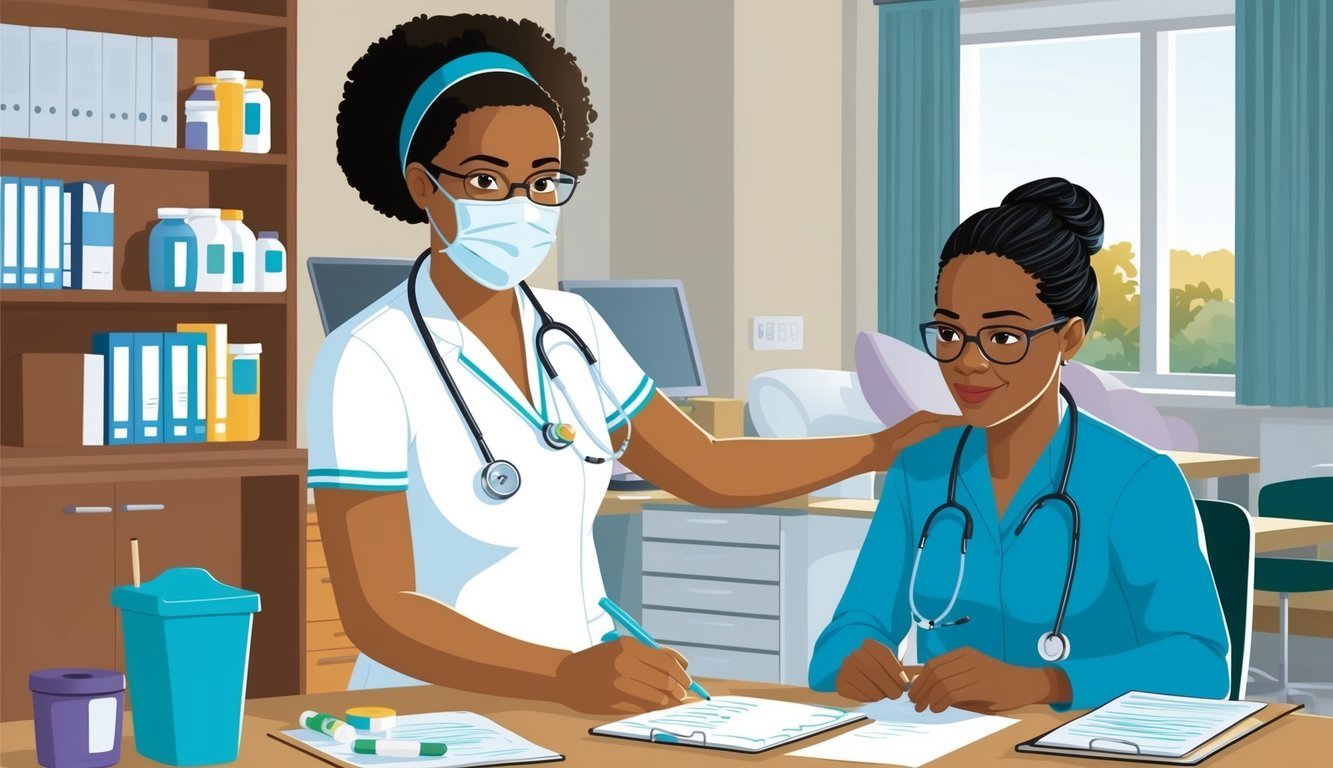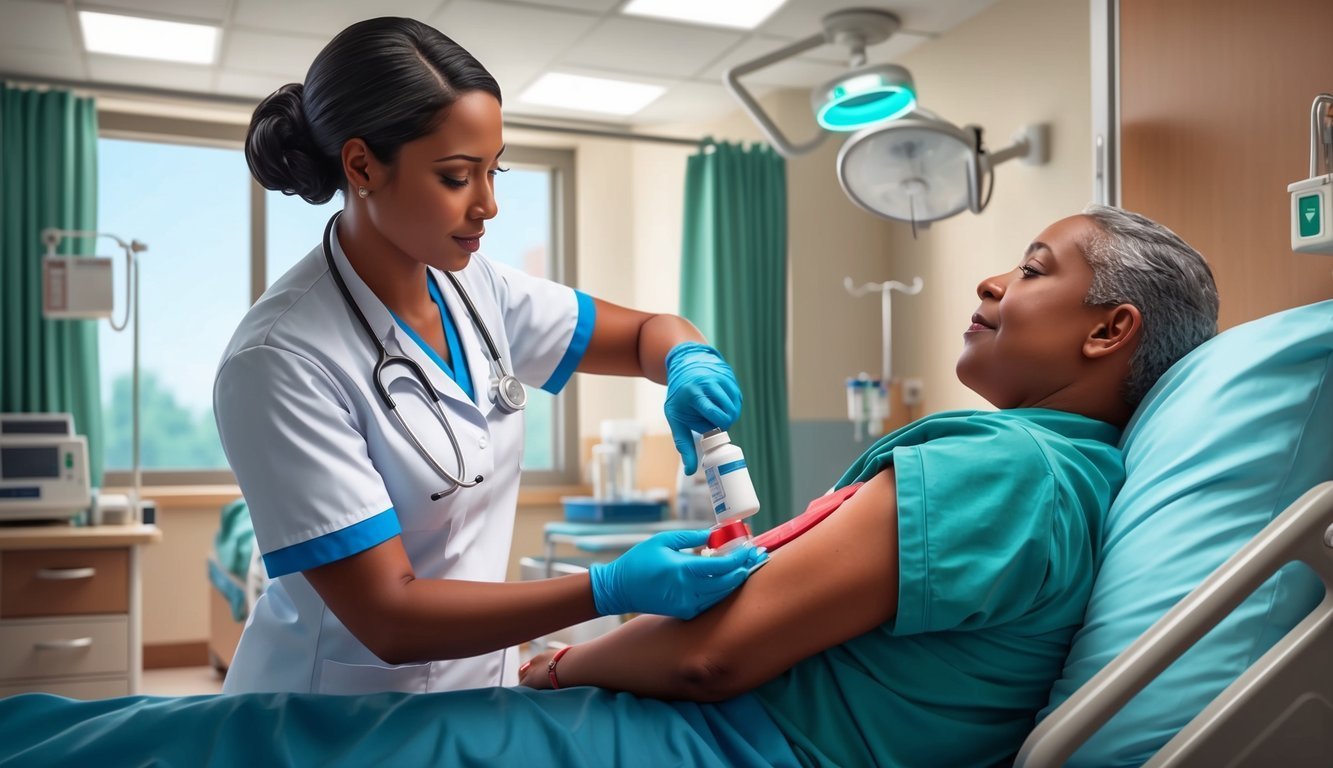As a Licensed Practical Nurse (LPN), you play a vital role in the healthcare system, providing essential care to patients in various settings. You can assist with daily activities, monitor patient health, and collaborate with healthcare teams, which makes you an integral part of patient care.
The path to becoming an LPN involves completing a training program and obtaining licensure.
This allows you to embark on a rewarding career that is both challenging and fulfilling.
From hospitals to private homes, LPNs have diverse career opportunities.
You may find yourself specializing in fields such as pediatrics, geriatrics, or even in long-term care facilities.
Each setting allows you to impact patients’ lives positively while also offering options for professional advancement and additional training.
The skills you acquire are not only important for patient care but also open doors to new roles and responsibilities within the healthcare field.
Understanding what you can do as an LPN is crucial for anyone considering this career path.
Whether it’s administering medications, assisting with medical procedures, or providing education to patients and families, the responsibilities are varied and meaningful.
Key Takeaways
- LPNs provide essential patient care in various healthcare settings.
- The career offers diverse opportunities for specialization and advancement.
- Completing an accredited program and obtaining licensure is necessary to practice as an LPN.
The Role of an LPN in the Healthcare System
Licensed Practical Nurses (LPNs) play a critical role in the healthcare system.
They provide essential patient care and support, working under the supervision of registered nurses (RNs) and physicians.
Understanding their scope of practice and the various healthcare settings where they work is important for appreciating their contributions.
Scope of Practice
The scope of practice for an LPN includes a variety of tasks and responsibilities.
You will find LPNs performing the following duties:
- Monitoring vital signs
- Assisting with daily living activities
- Administering medications
- Providing wound care
LPNs must follow state regulations, which define what they can and cannot do.
This scope can vary by location, so it’s essential to be aware of your state’s specific laws.
In many situations, LPNs coordinate with RNs and physicians to develop care plans focused on improving patient outcomes.
This collaboration is crucial in ensuring a seamless healthcare experience for patients.
Different Healthcare Settings
LPNs work in numerous healthcare environments, each requiring a unique skill set.
Common settings include:
| Healthcare Setting | Responsibilities |
|---|---|
| Hospitals | Provide direct patient care and support to RNs. |
| Nursing Homes | Assist elderly patients with daily living tasks. |
| Clinics | Handle patient assessments and basic care procedures. |
| Home Healthcare | Deliver medical care and assistance in patients’ homes. |
In hospitals, LPNs are part of a larger team, monitoring patients and assisting with procedures.
In nursing homes, you often provide long-term care, focusing on comfort and daily activities.
Clinics focus more on outpatient services, while home healthcare emphasizes one-on-one patient interactions.
Each setting allows you to develop your skills and make a meaningful impact on patient care.
Educational Pathway and Licensure
Becoming a Licensed Practical Nurse (LPN) requires specific educational steps and passing an important exam.
Understanding these processes can help you navigate your path to licensure effectively.
LPN Education Requirements
To become an LPN, you must complete a practical nursing program.
These programs are often offered at community colleges and typically last about 12 months.
You will receive training in areas such as patient care, basic nursing skills, and pharmacology.
Most programs include both classroom instruction and clinical experience.
You will learn how to provide care for patients under the supervision of registered nurses (RNs) and doctors.
Courses often cover topics like anatomy, nutrition, and nursing ethics.
Look for programs that are accredited to ensure you receive a quality education.
Many institutions also offer online nursing degree options, giving you flexibility in your studies.
Obtaining the NCLEX-PN Certification
After completing your education, you need to pass the NCLEX-PN (National Council Licensure Examination for Practical Nurses).
This exam tests your knowledge and skills essential for safe and effective patient care.
To obtain your certification, follow these steps:
- Apply through your state’s nursing board. Each state has its own requirements for applying.
- Register for the NCLEX-PN exam with Pearson VUE.
- Prepare thoroughly. Study materials often include practice exams and NCLEX review courses.
Passing the NCLEX-PN allows you to apply for licensure in your state.
Once licensed, you can begin your career as an LPN and explore various job opportunities in healthcare.
For additional information, visit the National Council of State Boards of Nursing.
LPN Clinical Skills and Responsibilities
As an LPN, you play a vital role in patient care.
Your clinical skills and responsibilities cover a range of essential tasks that help ensure patients receive the best possible treatment.
Two key areas include administering medications and assisting with diagnostic tests and wound care.
Administering Medications and Patient Care
In your role, you are responsible for administering medications as prescribed by physicians.
This includes oral medications, injections, and IV medications.
You must follow proper protocols to ensure patient safety.
Key Responsibilities:
- Verify prescriptions: Check the medication orders for accuracy.
- Monitor vital signs: Assess blood pressure, pulse, and temperature before and after administering medication.
- Educate patients: Inform patients about their medications, including purpose, dosage, and potential side effects.
- Document administration: Record all medications given and any reactions observed.
Patient care goes beyond medication.
You provide essential support by assisting with daily activities, monitoring patients, and reporting any changes in their condition.
Your attention to detail and communication with other healthcare team members are crucial in delivering effective care.
Assisting with Diagnostic Tests and Wound Care
You also assist in preparing patients for diagnostic tests, ensuring they understand the process.
This may include:
- Drawing blood: Obtain blood samples for lab tests.
- Performing basic tests: Assist with EKGs or urine tests.
- Monitoring during tests: Ensure patient comfort and safety throughout the procedures.
Wound care is another critical aspect of your responsibilities.
Wound Care Tasks:
- Cleansing: Clean wounds properly to prevent infection.
- Dressing changes: Apply and change dressings as instructed by healthcare providers.
- Patient education: Teach patients how to care for their wounds at home and recognize signs of infection.
By effectively managing these tasks, you contribute significantly to patient recovery and well-being.
For more information, visit NursingProcess.org for a comprehensive overview.
Career Opportunities and Advancement
As an LPN, you can explore various career paths and opportunities for growth, which can enhance your skills and increase your earning potential.
Specialized areas of healthcare and further education options play a significant role in your career advancement.
Working in Specialized Areas of Healthcare
LPNs have the chance to work in many specialized fields.
Some options include:
- Gerontology: Focus on elderly care in nursing homes or residential care facilities. Your role involves assisting in daily activities and monitoring health.
- Hospice Care: Provide comfort and support for terminally ill patients. You help manage symptoms and offer emotional support to families.
- Telehealth: Work remotely to provide patient care via technology. This role is growing and requires comfort with digital tools.
Specializing can lead to higher salaries and more fulfilling career experiences.
Jobs in these areas can provide you with valuable experience that may also open doors to future opportunities.
Advancement Opportunities and Further Education
Furthering your education can significantly impact your career.
You can pursue additional training or certifications in various fields, such as:
- Nurse Practitioner: This requires advanced education but offers a broader scope of practice and higher earning potential.
- School Nurse: Work in educational settings, promoting student health and wellness.
Returning to school, even part-time, can lead to higher positions and salaries.
The U.S. Bureau of Labor Statistics predicts job openings for LPNs to grow by 5% from 2022 to 2032, creating opportunities for those willing to advance their education.
Programs and resources, such as those highlighted in LPN Career Advancement, can guide your next steps.
Challenges and Rewards of Being an LPN

Being a Licensed Practical Nurse (LPN) comes with distinct challenges along with rewarding aspects.
You may encounter demanding hours and a dynamic work schedule that requires adaptability.
However, the emotional and professional rewards can make the effort worthwhile.
Navigating Long Hours and Work Schedules
As an LPN, you may face long hours that can affect your personal life.
Shifts can range from 8 to 12 hours and often include nights, weekends, and holidays.
You will need to manage your time effectively to maintain balance.
Many LPNs work with a healthcare team to create and manage patient care plans.
This means being available during the times when patients need support the most.
Developing coping strategies, such as effective communication and seeking support from colleagues, is vital.
In some cases, staffing shortages can put extra strain on your work schedule.
Being prepared for unexpected changes in shifts can help you stay focused on providing quality healthcare services.
Emotional and Professional Rewards
The role of an LPN offers both emotional and professional rewards.
You’ll have the opportunity to make a significant impact on patient care, building relationships with patients and their families.
Every day, you will provide comfort and support during difficult times, which can be deeply fulfilling.
Celebrating patient milestones and recovery can be a source of pride.
Your involvement in a diverse healthcare team enhances your skills and broadens your experience.
LPNs often enjoy job stability and competitive pay.
Entering the field sooner than some other healthcare professionals allows you to start earning quicker.
This combination of factors creates a satisfying career path that many find rewarding.
For more information on the day-to-day challenges and rewards of being an LPN, consider visiting resources like Nurse Journal or Nursing Process.
Frequently Asked Questions

This section covers important questions about the role of Licensed Practical Nurses (LPNs).
It addresses alternative career paths, salary comparisons, job responsibilities compared to Registered Nurses (RNs), legal limitations, potential employment settings, and factors that make being an LPN a viable long-term choice.
What are some alternative career paths for an LPN?
As an LPN, you have several options for career advancement.
You can transition to roles such as health educator, pharmaceutical sales representative, or forensic nurse.
These careers often come with higher salary potential than typical LPN positions.
How do LPN salaries compare within various healthcare settings?
LPN salaries can vary based on the healthcare setting.
For example, LPNs working in hospitals tend to earn more than those in nursing homes.
It’s essential to research specific settings to understand salary expectations.
According to recent data, the average salary for LPNs is around $59,627 per year.
What are the differences in job responsibilities between an LPN and an RN?
LPNs typically handle basic patient care tasks.
This includes monitoring vital signs, assisting with daily activities, and administering medications.
Meanwhile, RNs can perform more complex procedures, develop care plans, and take on supervisory roles.
What are the legal scope of practice limitations for LPNs?
LPNs have a defined scope of practice that varies by state.
Generally, they cannot perform certain high-level medical procedures.
Make sure to understand your state’s regulations to know the limitations specific to your practice.
In what settings outside of traditional nursing homes can LPNs find employment?
LPNs have opportunities in various healthcare settings.
This includes hospitals, clinics, home health care, and even telehealth services.
Some remote positions focus on data abstraction, patient monitoring, and utilization management, which do not involve direct patient care.
What factors contribute to making LPN a viable long-term career choice?
LPNs have strong job demand and growth in the healthcare field.
The profession allows for flexibility in job settings and hours.
Additionally, LPNs can pursue further education and specialization, leading to more career options and higher earning potential.

